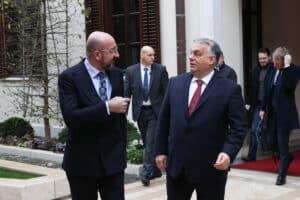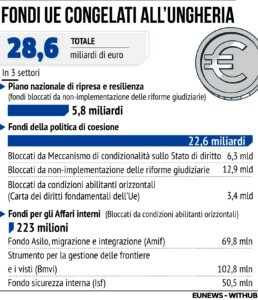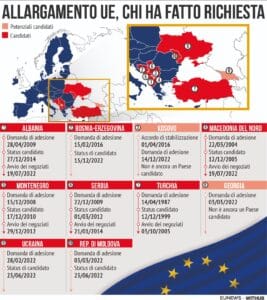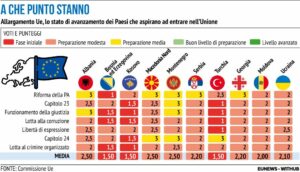Bruxelles – The countdown has begun to a crucial week for the prospects of EU enlargement, but also for one of the most delicate tests of the unity of the Twenty-Seven. For weeks now, the Hungarian Prime Minister, Viktor Orbán, has been increasing the pressure on two appointments of extreme importance for the future of the Union, which in different ways intersect and depend on the will of the strong man of Budapest on Ukraine: the EU-Western Balkans summit on Wednesday (13 December) and the European Council on Thursday and Friday (14-15 December).

“Surely Orbán’s veto will be at the top of the agenda of the discussions. I hope that European unity will not be broken because this is not the time to weaken our support for Ukraine,” was the comment of the EU High Representative for Foreign Affairs and Security Policy, Josep Borrell, entering the Foreign Affairs Council today (11 December) in Brussels. The trip of the President of the European Council, Charles Michel, to Budapest on 27 November to attempt a very difficult mediation with Orbán seems to have been to no avail: only a week ago, the Hungarian prime minister himself sent Michel a letter urging him to remove from the summit agenda all items on decisions concerning Kiev – from the start of accession negotiations to financial support – “until a consensus is found on our future strategy towards Ukraine”. And nothing has moved in the last few days, not even during bilateral discussions with the French president, Emmanuel Macron, and the Spanish premier, Pedro Sánchez.
Thus, two days before the start of the three-day summit in Brussels, EU enlargement is still hostage to Budapest’s veto power. Because – as the Ukrainian Foreign Minister, Dmytro Kuleba, pointed out today in Brussels – “enlargement is a vast process that does not only cover Ukraine. I do not even want to think about the scenario of a general failure on this issue“. In other words, no matter how successful the EU-Western Balkans summit (scheduled from 5 p.m. on Wednesday) may be, one cannot rejoice until the European Council’s “welcome” conclusions on the start of accession negotiations for Ukraine, as recommended by the EU Commission on 8 November last, are put on paper. The motivation was summed up in the words of the Lithuanian Foreign Minister, Gabrielius Landsbergis: “If there is no positive solution, dark times will come; the only way I read Hungary’s position is that it positions itself against the Union and everything it does.” EU enlargement and internal reform path included.
 Time is running out to try to break the deadlock, but diplomatic pressure is intense in Brussels from almost all governments to avert an all-out failure this week.”I hope that a step forward can be taken on the Hungarian side, even after the decision to guarantee the freedom of teaching the Hungarian language for the minority living in Ukraine,” Italian Foreign Minister Antonio Tajani told the European press: “I hope that we can proceed with a favourable stance from Budapest towards our position”. Her Finnish colleague Elina Valtonen was harsher: “Hungary’s position has been very regrettable over the last few months”. Answering questions on how to break the deadlock, Latvian Minister Arturs Kariņš recalled that “the Commission is considering all options to overcome the impasse, our mission as politicians is to find solutions”. The reference is to the expected release of “up to a maximum” of EUR 10 billion “before 15 December” from the cohesion policy funds (out of a total of EUR 28.6 billion frozen) – as senior European officials have disclosed – after giving the go-ahead to the EUR 4.6 billion RePowerEu chapter, with its EUR 900 million automatic and non-committed pre-financing.
Time is running out to try to break the deadlock, but diplomatic pressure is intense in Brussels from almost all governments to avert an all-out failure this week.”I hope that a step forward can be taken on the Hungarian side, even after the decision to guarantee the freedom of teaching the Hungarian language for the minority living in Ukraine,” Italian Foreign Minister Antonio Tajani told the European press: “I hope that we can proceed with a favourable stance from Budapest towards our position”. Her Finnish colleague Elina Valtonen was harsher: “Hungary’s position has been very regrettable over the last few months”. Answering questions on how to break the deadlock, Latvian Minister Arturs Kariņš recalled that “the Commission is considering all options to overcome the impasse, our mission as politicians is to find solutions”. The reference is to the expected release of “up to a maximum” of EUR 10 billion “before 15 December” from the cohesion policy funds (out of a total of EUR 28.6 billion frozen) – as senior European officials have disclosed – after giving the go-ahead to the EUR 4.6 billion RePowerEu chapter, with its EUR 900 million automatic and non-committed pre-financing.
EU Enlargement at Brussels Summits
The topic of enlargement will for obvious reasons be a priority at the EU-Western Balkans summit, which, as EU sources report, will focus on progress over the past year (since the Tirana summit on 6 December, 2022). The positive news coming from Montenegro – which “within the next six months” is expected to “close chapters 23 and 24” of the EU accession negotiations – will be assessed – the possibility of decoupling the accession path of Albania and North Macedonia will be considered – although “it is not the option we want” – and the very complicated year for relations between Serbia and Kosovo and the repercussions on the Pristina-Belgrade dialogue will be taken stock of. Above all, it will be necessary to consider which position to adopt towards Bosnia and Herzegovina, currently at a crossroads between the European path and the secessionist sirens in Milorad Dodik‘s Republika Srpska.
 It is here that one has to consider what will be on the agenda of the European Council starting the day after the EU-Western Balkans summit. “The Council is ready to open EU accession negotiations with Bosnia and Herzegovina, once the necessary degree of compliance with the membership criteria has been achieved,” reads the draft conclusions of the EU leaders’ summit viewed by Eunews. Nothing new compared to the European Commission’s recommendation, but it should not be forgotten that Orbán’s long shadow also looms in the case of EU enlargement to Bosnia and Herzegovina. In the face of Dodik’s secessionist policies and the increasingly explicit proximity to autocrat Vladimir Putin after the Russian invasion of Ukraine (not disguised even by the Hungarian prime minister), the European Union already has a framework of restrictive measures ready to be applied. However, as revealed by EU sources to Eunews, it is Hungary that does not allow the green light because of the political closeness between Orbán and the Bosnian Serb leader who wants secession from Sarajevo.
It is here that one has to consider what will be on the agenda of the European Council starting the day after the EU-Western Balkans summit. “The Council is ready to open EU accession negotiations with Bosnia and Herzegovina, once the necessary degree of compliance with the membership criteria has been achieved,” reads the draft conclusions of the EU leaders’ summit viewed by Eunews. Nothing new compared to the European Commission’s recommendation, but it should not be forgotten that Orbán’s long shadow also looms in the case of EU enlargement to Bosnia and Herzegovina. In the face of Dodik’s secessionist policies and the increasingly explicit proximity to autocrat Vladimir Putin after the Russian invasion of Ukraine (not disguised even by the Hungarian prime minister), the European Union already has a framework of restrictive measures ready to be applied. However, as revealed by EU sources to Eunews, it is Hungary that does not allow the green light because of the political closeness between Orbán and the Bosnian Serb leader who wants secession from Sarajevo.
Compared to what was recommended by Ursula von der Leyen‘s cabinet in the EU Enlargement Package 2023, the game will be played in particular on what appears in points 14 and 15 of the draft conclusions: “The European Council decides to open accession negotiations with Ukraine and the Republic of Moldova” and invites the 27 competent ministers to “adopt the respective negotiating frameworks once the measures indicated” by the General Affairs Council have been adopted. Also on hold is Georgia, for which a decision should be made to “grant candidate country status“, but with EU enlargement hostage to Budapest, nothing is certain at the moment. Because, as EU sources unabashedly explain, if Ukraine’s path is blocked by Orbán “we do not yet know whether other countries will make connections on the merit-based process for the other candidates as well”.
Find further insights into the Balkan region in the BarBalcani newsletter hosted by Eunews
English version by the Translation Service of Withub







